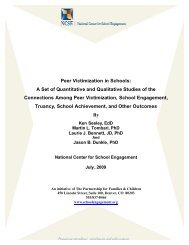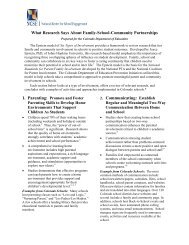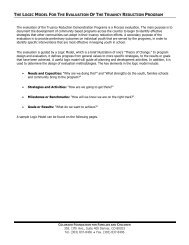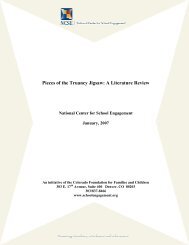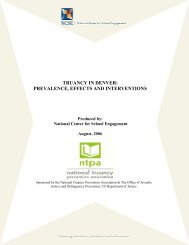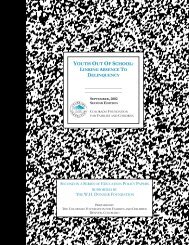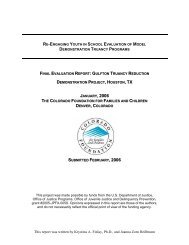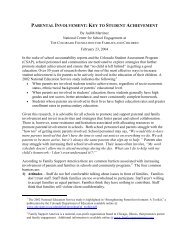Section 1: Academic Achievement - National Center for School ...
Section 1: Academic Achievement - National Center for School ...
Section 1: Academic Achievement - National Center for School ...
Create successful ePaper yourself
Turn your PDF publications into a flip-book with our unique Google optimized e-Paper software.
them eat in class. Additional reasons were because the teacher gave them homework or didn’t<br />
give them homework. That depended on whether the student liked homework or didn’t. The<br />
same held true <strong>for</strong> reasons why students didn’t like their teachers. They yelled, they gave<br />
homework, they had to miss recess. Those answers were not a surprise. The group of<br />
students I surveyed struggled with identifying overall negative teacher experiences. They all<br />
had days/parts of days where they may not have liked their teachers, but none of them could<br />
identify a teacher or characteristics of a teacher they didn’t like. Was this because they were<br />
younger students and had access to a limited number of teachers? Was this because some of<br />
these kids were younger and they couldn’t remember what happened back in first grade? Was<br />
this because our school has a good staff and kids feel com<strong>for</strong>table and welcome? Was this<br />
because they weren’t going to rat out another teacher to me? Or was this because I was<br />
asking <strong>for</strong> in<strong>for</strong>mation that was developmentally beyond them? My guess would be the latter,<br />
but on the other hand, many of us are capable of remembering the really negative experiences<br />
in our lives and some can go back to ages fours and five. There<strong>for</strong>e, I might also conclude<br />
that the students I surveyed had mostly positive experiences with teachers.<br />
However, when I asked the students to tell me what makes the good students good and the<br />
bad students bad they had an easier time answering that one. I assumed their answers would<br />
be on an academic level, (good reader, good at math, knows all the answers, etc.) but once<br />
again I was surprised by their responses. The majority of their answers lead to social reasons.<br />
They help me, they listen, they turn in their homework, they are nice to me, and they are<br />
funny and make me laugh.<br />
As I was giving the survey I asked the kids to be honest in their responses and I explained the<br />
research project. Now it is possible some of the answers were given just to please “the<br />
teacher”, but I saw my name mentioned more than once on a few of the questions getting at<br />
the negative aspects of the school environment which lead me to believe that a least some of<br />
the students were being honest.<br />
As I reviewed the surveys and thought back to my research question, I realized that I had<br />
addressed classroom/ school community, peer and staff relationships, but the first survey had<br />
not accessed any data on instructional strategies. I had some idea of what instructional<br />
Action Research to Study Homelessness and High Mobility in <strong>School</strong> Communities 84



